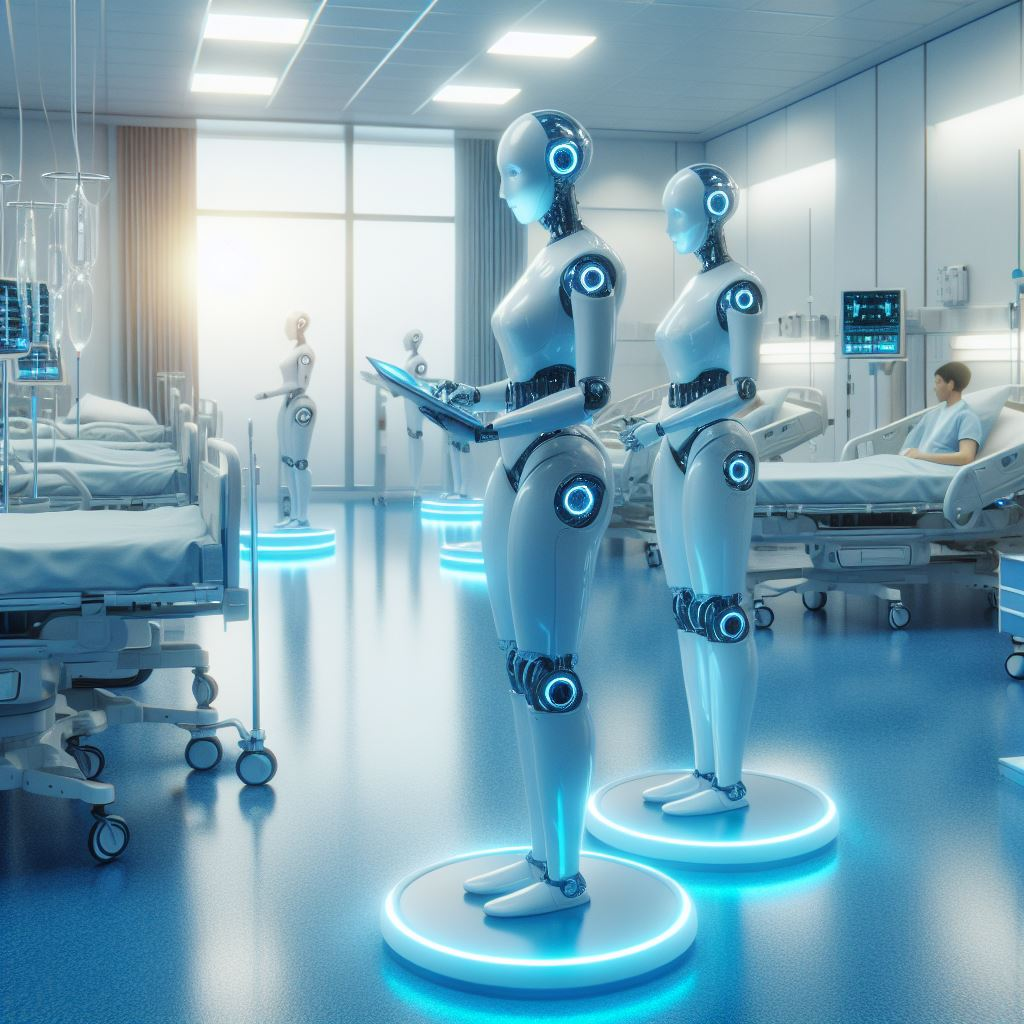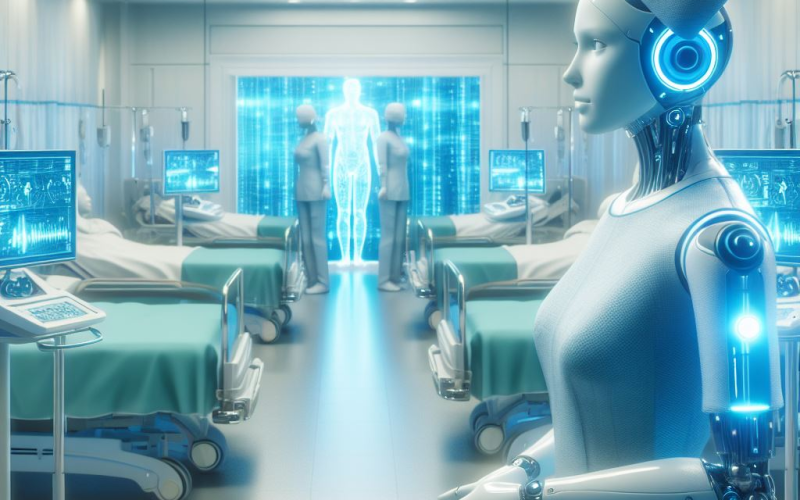Author Introduction:
Dr. Olivia Wong, a renowned healthcare technology researcher with over 15 years of experience under her belt, dives into the intriguing realm of Nvidia’s AI nurses. Dr. Wong meticulously dissects the potential impact of this technology on the future of healthcare, meticulously examining both its exciting possibilities and potential hurdles.
The Rise of AI in Healthcare
The healthcare industry is undergoing a metamorphosis, rapidly embracing artificial intelligence (AI) to bolster efficiency, accuracy, and most importantly, patient outcomes. From AI-powered diagnostics that can pinpoint ailments with uncanny precision to robotic surgery that offers minimally invasive procedures, technology is fundamentally transforming the way we deliver and receive care.
Imagine a future where patients are continuously monitored by a tireless guardian, a virtual Florence Nightingale who never sleeps and can detect even the subtlest changes in their vital signs. This is the future that Nvidia, a leading graphics processing unit (GPU) manufacturer, envisions with its innovative concept: AI nurses.
Introducing Nvidia’s AI Nurses
These AI systems are not sentient beings from science fiction, but rather sophisticated computer programs powered by advanced algorithms and real-time data. Nvidia’s AI nurses function by meticulously analyzing a multitude of data points, including vital signs, medical history, and patient behavior. This allows them to monitor patients continuously, provide education and support tailored to individual needs, and even streamline administrative tasks that can bog down human nurses.
How Could AI Nurses Benefit Patients?
The potential benefits of AI nurses for patients are multifaceted, promising to revolutionize the healthcare experience. Let’s delve deeper into some of the most transformative possibilities:
- Improved Monitoring and Early Intervention: Unlike their human counterparts who require breaks and cannot be constantly present, AI nurses can monitor patients around the clock. This continuous monitoring allows them to detect even the slightest fluctuations in vital signs, such as a rise in heart rate or a drop in blood oxygen levels. With this real-time data at their disposal, AI nurses can trigger alerts for human nurses, enabling them to intervene promptly and potentially prevent critical events.
Imagine a scenario where a patient recovering from surgery experiences a sudden drop in blood pressure. A human nurse making routine checks might not detect this change immediately. However, an AI nurse continuously monitoring the patient’s vitals would identify this anomaly instantly and send an alert, allowing the human nurse to address the situation swiftly. This prompt intervention could make all the difference in the patient’s recovery process.
- Enhanced Patient Education and Support: Traditionally, patient education often occurs during brief interactions with nurses or doctors during rounds. AI nurses, however, have the potential to provide patients with ongoing and personalized education and support. By analyzing a patient’s medical history and diagnosis, AI nurses can curate educational materials specific to their condition. This could include information about medications, potential side effects, and healthy lifestyle choices that can aid in recovery.
Furthermore, AI nurses can offer emotional support and companionship, particularly for patients who may be feeling isolated or anxious during their hospitalization. This could involve reminding patients to take their medication, offering words of encouragement, or simply providing a listening ear.
- Streamlining Administrative Tasks: Administrative tasks such as scheduling appointments, updating medical records, and managing paperwork are a significant time drain for human nurses. AI nurses, on the other hand, can handle these tasks with remarkable efficiency. By automating these administrative burdens, AI nurses can free up valuable time for human nurses to focus on what they do best: providing compassionate and personalized care to their patients.
Imagine a nurse who spends a significant portion of her shift managing paperwork and scheduling appointments. With an AI nurse handling these administrative tasks, she would have more time to spend at patients’ bedsides, offering emotional support, answering questions, and ensuring their comfort. This shift in focus can significantly enhance the quality of patient care.

Potential Concerns and Challenges
While the potential benefits of AI nurses are undeniable, there are also challenges that need to be carefully considered:
- Ethical Considerations and Bias: AI algorithms are only as good as the data they are trained on. If the data used to train AI nurses is biased, it can lead to biased decision-making and unfair treatment for certain patient groups. Mitigating bias in AI algorithms is crucial to ensure ethical implementation in healthcare.
Additionally, the question of patient privacy and data security looms large. As AI nurses rely on a vast amount of patient data to function, robust security measures must be in place to safeguard sensitive information and prevent data breaches.
- Job Displacement in the Nursing Field: The automation of some tasks by AI nurses raises concerns about job displacement in the nursing profession. However, it’s important to remember that AI nurses are not designed to replace human nurses entirely. The human touch, empathy, and critical thinking skills that nurses bring to patient care remain irreplaceable. Instead, AI nurses are more likely to augment nurses’ capabilities, freeing them from mundane tasks and allowing them to focus on the more complex aspects of patient care.
Imagine a nurse who is constantly bogged down with administrative duties, leaving her with less time to connect with her patients on a personal level. With an AI nurse handling the administrative burden, this nurse can dedicate more time to active listening, emotional support, and providing guidance tailored to each patient’s unique needs. This human-AI collaboration can lead to a more holistic and compassionate patient experience.
However, the potential for job displacement in the nursing field does require thoughtful consideration. Transition plans and retraining programs would be necessary to ensure that nurses whose roles are impacted by AI integration have the support they need to adapt and develop new skillsets.
- Data Privacy and Security Risks: As mentioned earlier, the use of AI nurses in healthcare hinges on the collection and analysis of a vast amount of patient data. This data includes everything from vital signs and medical history to medication use and personal demographics. A data breach involving this sensitive information could have devastating consequences for patients.
To mitigate these risks, robust cybersecurity measures need to be implemented. This includes encrypting patient data, enforcing strict access controls, and regularly updating security software. Furthermore, clear and transparent data privacy policies must be established to inform patients about how their data is collected, used, and stored.
The Road Ahead: Collaboration is Key
The successful integration of AI nurses into the healthcare system hinges on collaboration between various stakeholders. This includes:
- AI Developers: Those responsible for designing and training AI algorithms need to prioritize fairness, transparency, and accountability. Regular audits and bias detection mechanisms must be in place to ensure that AI nurses are making unbiased decisions.
- Healthcare Professionals: Doctors, nurses, and other healthcare professionals play a crucial role in providing feedback on the development and implementation of AI nurses. Their insights and expertise are essential in ensuring that AI nurses are truly aligned with the needs of patients and healthcare providers.
- Policymakers: Governments and regulatory bodies need to establish clear guidelines and regulations for the development and use of AI in healthcare. These regulations should address issues such as data privacy, security, and ethical considerations.
By fostering open communication and ongoing collaboration, these stakeholders can ensure that AI nurses are implemented responsibly and ethically, ultimately leading to improved patient care.
Conclusion: A Promising Future for AI-Assisted Care
Nvidia’s AI nurses represent a significant leap forward in healthcare technology. While challenges remain, the potential benefits for patients, nurses, and the healthcare system as a whole are substantial. As we move forward, a focus on responsible development, ethical implementation, and human-AI collaboration will be paramount in unlocking the full potential of this innovative technology.
The future of healthcare is likely to be a blend of human expertise and artificial intelligence. AI nurses have the potential to revolutionize the way we deliver and receive care, but it’s crucial to remember that they are tools, not replacements. By harnessing the power of AI while safeguarding human values, we can create a healthcare system that is more efficient, effective, and compassionate for all.












